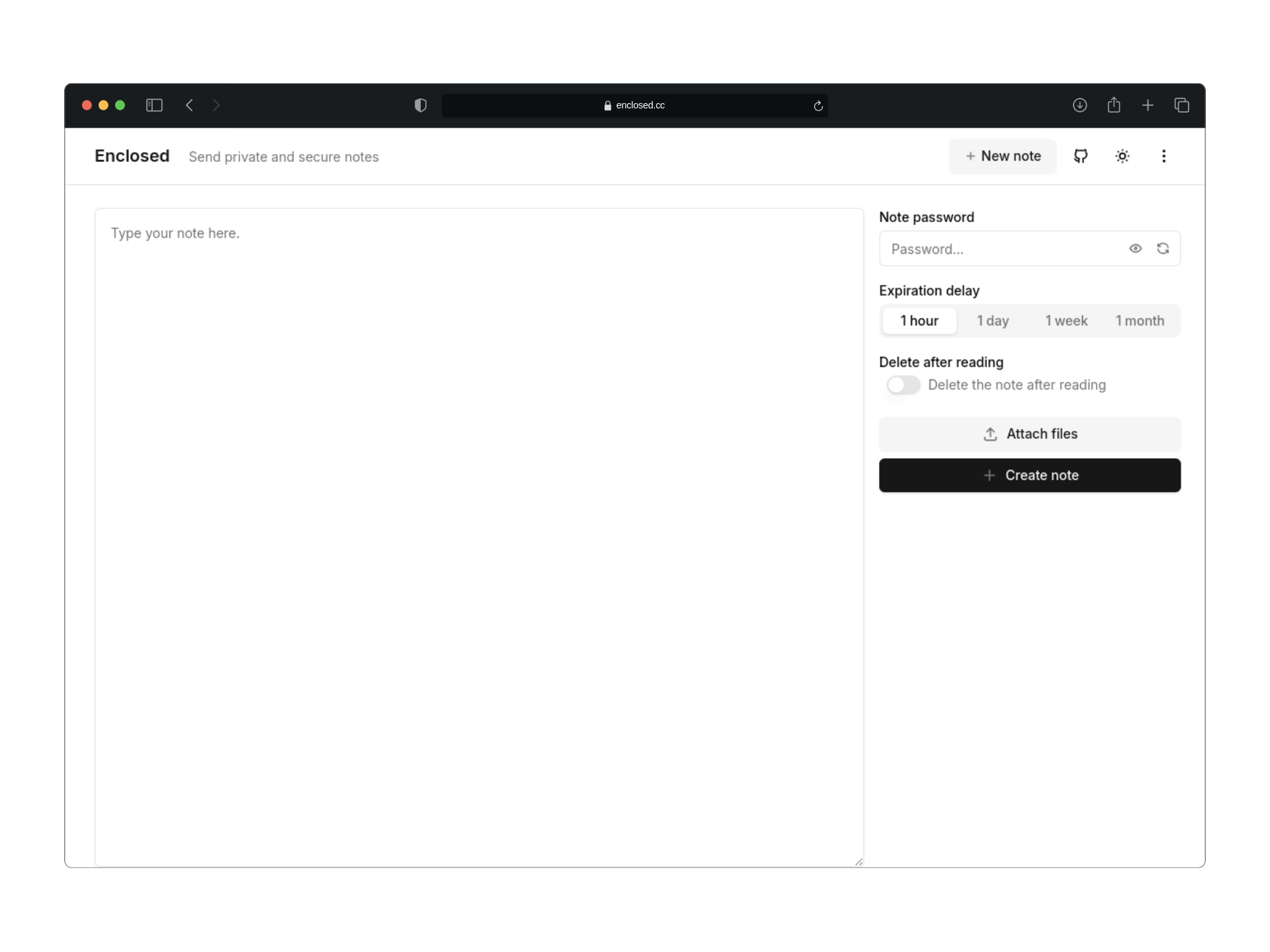
Minimalistic web application designed for sending end-to-end encrypted notes and files.
Demo • Docs • CLI • Self-hosting
Enclosed is a minimalistic web application designed for sending private and secure notes.
All notes are end-to-end encrypted, ensuring that the server and storage have zero knowledge of the content. Users can set a password, define an expiration period (TTL), and choose to have the note self-destruct after being read.
A live instance is available at enclosed.cc.
- End-to-End Encryption: Your notes are encrypted on the client side, using AES-GCM with a 256-bit key derived using PBKDF2.
- File Attachments: Share files securely with your notes.
- Zero Knowledge: The server does not have access to the content of the notes or files.
- Configurable Security Options: Set a password, expiration time, and choose self-destruction after the note is read.
- Minimalistic UI: Simple and intuitive user interface for quick note sharing.
- i18n Support: Available in multiple languages.
- Authentication: Optional email/password authentication to create notes.
- Dark Mode: A dark theme for late-night note sharing.
- Responsive Design: Works on all devices, from desktops to mobile phones.
- Open Source: The source code is available under the Apache 2.0 License.
- Self-Hostable: Run your instance of Enclosed for private note sharing.
- CLI: A command-line interface for creating notes from the terminal.
- Very low environmental impact: the app and the docs is rated A+ on websitecarbon.com (see here and here).
You can quickly run the application using Docker.
docker run -d --name enclosed --restart unless-stopped -p 8787:8787 corentinth/enclosedPlease refer to the self-hosting documentation for more information on how to configure and run the application. For example:
You can refer to the configuration documentation for more information on how to configure the application.
- Note Creation: A user creates a note with some content and optionally sets a password.
- Key Generation: A base key is generated on the client side to ensure encryption, even if no password is set.
- Master Key Derivation: A master key is derived from the base key and the optional password using PBKDF2 with SHA-256.
- Note Encryption: The note is encrypted using the master key with AES-GCM encryption.
- Sending to Server: The encrypted note is sent to the server along with some metadata (ttl, is the note password-protected, should it self-destruct after reading).
- Storage and ID Assignment: The server stores the encrypted note and provides an ID for it.
- Link Generation: A link is generated that includes the note ID and the base key (included as a URL hash fragment to maximize security since hashes are not sent to the server).
- Link Sharing: The link is shared with the intended recipient.
- Note Retrieval: The recipient opens the link, and the app fetches the encrypted note and metadata from the server using the note ID.
- Key Extraction: The base key is extracted from the URL hash fragment.
- Password Prompt (If Applicable): If the note is password-protected, the recipient is prompted to enter the password.
- Master Key Derivation: The master key is derived from the base key and the entered password using PBKDF2 with SHA-256.
- Note Decryption: The note is decrypted using the master key with AES-GCM and can now be read by the recipient.
This ensures that the note remains securely encrypted during transmission and storage, with decryption only possible by those with the correct link and (if applicable) password.
The Enclosed CLI allows you to create notes from the terminal. You can install it globally using npm, yarn, or pnpm.
# with npm
npm install -g @enclosed/cli
# with yarn
yarn global add @enclosed/cli
# with pnpm
pnpm add -g @enclosed/cli# Basic usage
enclosed create "Hello, World!"
# Using stdin
cat file.txt | enclosed create
# With full options
enclosed create --deleteAfterReading --password "password" --ttl 3600 "Hello, World!"# The password will be prompted if the note is password-protected
enclosed view <note-url>
# Or you can provide the password directly
enclosed view --password "password" <note-url># By default, the CLI uses the public instance at enclosed.cc
enclosed config set instance-url https://enclosed.ccThis project is organized as a monorepo using pnpm workspaces. The structure is as follows:
- packages/app-client: Frontend application built with SolidJS.
- packages/app-server: Backend application using HonoJS.
- packages/deploy-cloudflare: Cloudflare Pages build scripts and configuration.
- packages/lib: Core functionalities of Enclosed.
- packages/cli: Command-line interface for Enclosed.
Contributions are welcome! Please refer to the CONTRIBUTING.md file for guidelines on how to get started, report issues, and submit pull requests.
You can find easy-to-pick-up tasks with the good first issue label.
This project is licensed under the Apache 2.0 License. See the LICENSE file for more information.
This project is crafted with ❤️ by Corentin Thomasset. If you find this project helpful, please consider supporting my work.
Thank you to all the contributors who have helped make Enclosed better!
Enclosed would not have been possible without the following open-source projects:
- Frontend
- SolidJS: A declarative JavaScript library for building user interfaces.
- Shadcn Solid: UI components library for SolidJS based on Shadcn designs.
- UnoCSS: An instant on-demand atomic CSS engine.
- Tabler Icons: A set of open-source icons.
- And other dependencies listed in the client package.json
- Backend
- HonoJS: A small, fast, and lightweight web framework for building APIs.
- Unstorage: An unified key-value storage API.
- Zod: A TypeScript-first schema declaration and validation library.
- And other dependencies listed in the server package.json
The live instance of Enclosed is hosted on Cloudflare Pages using Cloudflare KV for storage.
- PrivateBin: A minimalist, open-source online pastebin where the server has zero knowledge of pasted data.
- Bitwarden Send: A secure and ephemeral way to share sensitive information.
- The shadcn playground example for the ui
Please use the issue tracker on GitHub for any questions or feedback.
